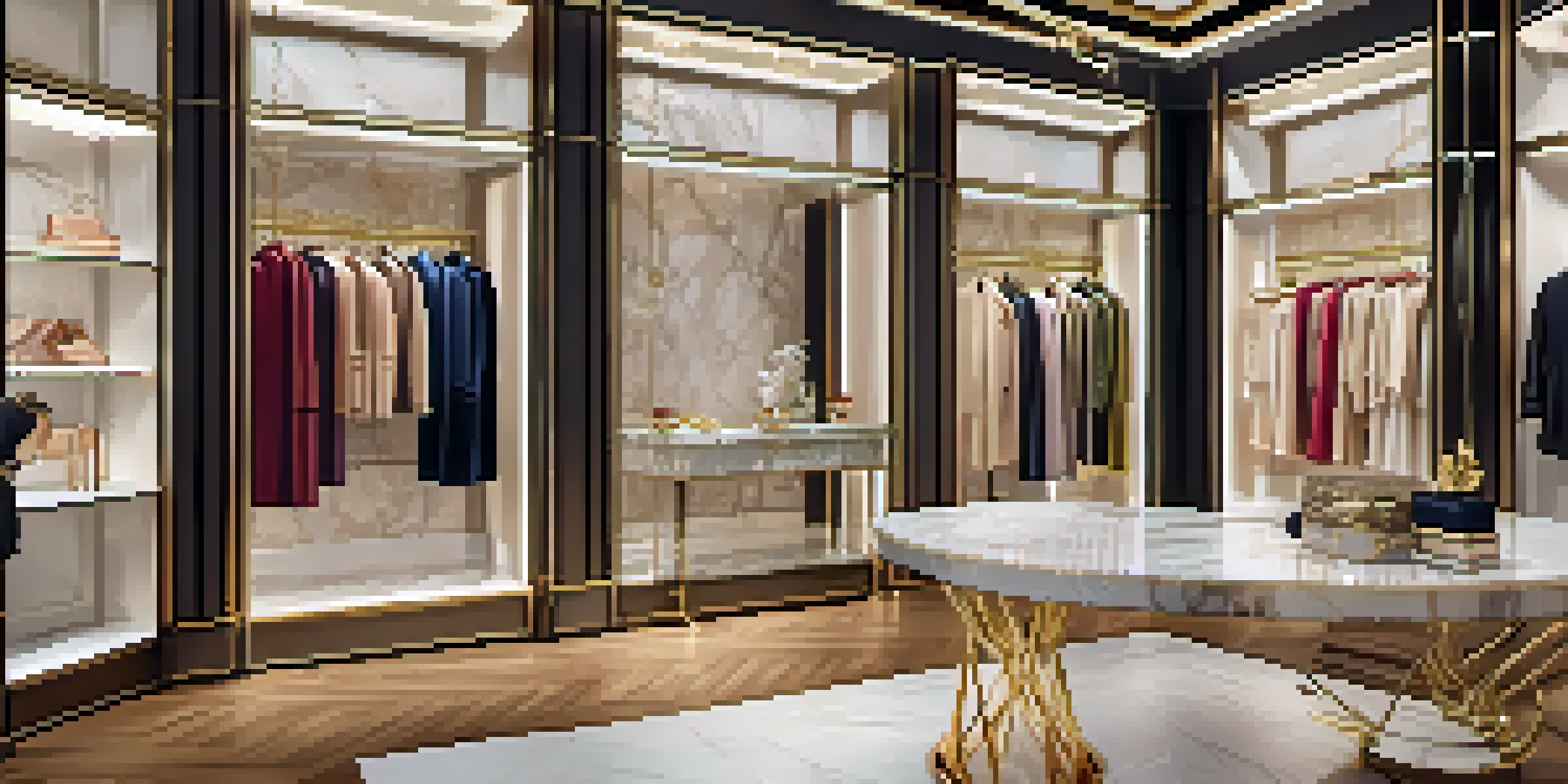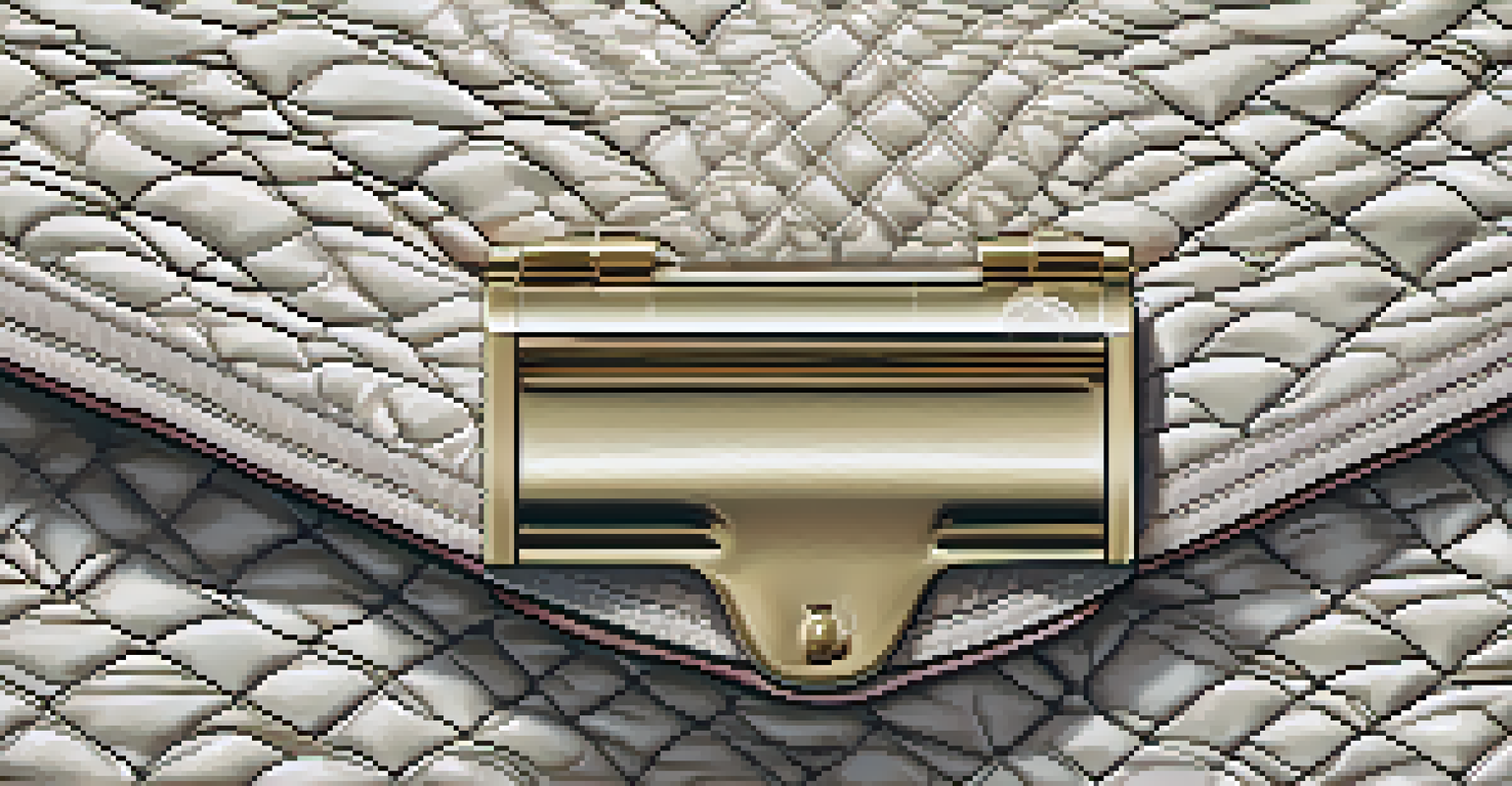The Impact of Global Crises on Luxury Brand Responsibility

Understanding Luxury Brand Responsibility in Today's World
Luxury brands have long been associated with exclusivity and prestige, but in today's interconnected world, their responsibilities have expanded significantly. Consumers now expect these brands to uphold ethical standards, not just in product quality but also in social impact. This shift reflects a growing awareness of global issues, prompting brands to align their values with those of their customers.
Sustainability is no longer a choice; it's a necessity for luxury brands to thrive in the modern world.
For instance, luxury brands are increasingly scrutinized for their supply chain practices, including labor conditions and environmental impacts. The transparency demanded by consumers means that luxury brands cannot afford to overlook their responsibilities. They are now expected to contribute positively to society, rather than just profit from it.
As we delve deeper into the impact of global crises on luxury brands, it's essential to understand how these challenges can reshape brand narratives. The evolving expectations from consumers can push brands to innovate responsibly, ensuring that their practices align with a broader commitment to sustainability and ethical behavior.
The Influence of Global Events on Consumer Expectations
Global events, such as pandemics or social movements, have a profound impact on consumer expectations. During crises, consumers often reassess their values, leading them to favor brands that demonstrate social responsibility. This trend is particularly evident in the luxury sector, where customers are increasingly selective about where they spend their money.

For example, during the COVID-19 pandemic, many luxury brands pivoted to produce personal protective equipment or support healthcare initiatives. This move not only showcased their adaptability but also resonated with consumers who appreciated brands that took action during challenging times. Such initiatives can significantly enhance brand loyalty and reputation.
Luxury Brands Embrace Social Impact
Luxury brands are increasingly expected to align their practices with ethical standards and contribute positively to society.
Ultimately, luxury brands must navigate these shifting expectations carefully. A failure to respond appropriately to global crises can result in backlash, while proactive engagement can lead to strengthened consumer relationships and trust.
The Role of Sustainability in Luxury Brand Strategy
Sustainability has emerged as a cornerstone of brand responsibility, especially for luxury brands that are traditionally associated with resource-intensive practices. As consumers become more environmentally conscious, they increasingly demand sustainable practices from luxury brands. This shift is not merely a trend but a fundamental change in consumer behavior.
In times of crisis, consumers want to know that the brands they support stand for something beyond profit.
Luxury brands are now investing in sustainable materials and ethical sourcing to align with these consumer expectations. For instance, some brands are adopting circular economy principles, focusing on reducing waste through recycling and upcycling initiatives. Such strategies not only mitigate environmental impact but also resonate with a growing demographic of eco-conscious shoppers.
By prioritizing sustainability, luxury brands can enhance their appeal while fulfilling their ethical obligations. This commitment can also serve as a competitive advantage, differentiating them in a crowded market that increasingly values ethical consumerism.
Social Responsibility: A New Luxury Brand Imperative
Beyond environmental concerns, luxury brands are being called upon to address social issues, including diversity, equity, and inclusion. The rise of social movements has spotlighted the need for brands to take a stand on these pressing matters. Consumers expect luxury brands to not only reflect these values but also actively contribute to positive change.
For instance, many luxury brands have launched initiatives aimed at supporting underrepresented communities, whether through partnerships with diverse designers or funding social programs. These actions signal a commitment to social responsibility and can significantly enhance brand loyalty among consumers who prioritize these issues.
Sustainability Shapes Brand Strategy
As consumers demand sustainable practices, luxury brands are investing in ethical sourcing and circular economy principles.
As luxury brands embrace social responsibility, they must remain authentic in their efforts. Consumers are quick to identify insincerity, and brands that fail to back up their claims with tangible actions can face significant backlash.
Navigating Crisis Communication in Luxury Branding
Effective crisis communication is vital for luxury brands as they navigate challenges posed by global events. A well-thought-out communication strategy can help brands maintain consumer trust during uncertain times. It's essential for luxury brands to be transparent and responsive, addressing issues head-on rather than shying away from them.
For example, during the Black Lives Matter movement, many luxury brands released statements expressing solidarity and support for racial equality. However, those that backed their words with actions, such as donations to relevant causes or initiatives to promote diversity within their organizations, were better received by consumers. This highlights the importance of not just talking the talk but walking the walk.
In an era where consumers expect accountability, luxury brands must prioritize open and honest dialogue. By doing so, they can foster a sense of connection with their audience, reinforcing their brand values and commitment to responsibility.
The Impact of Digital Transformation on Luxury Brands
Digital transformation has revolutionized the luxury industry, particularly in how brands communicate their values and responsibilities. With the rise of social media and e-commerce, luxury brands can engage directly with consumers, sharing their commitments to sustainability and social issues in real-time. This direct communication fosters a sense of community and accountability.
Moreover, digital platforms allow brands to showcase their responsible practices more vividly, whether through storytelling or behind-the-scenes content. Consumers are drawn to transparency, and digital tools provide an opportunity for brands to share their journey toward responsibility, from ethical sourcing to community engagement.
Crisis Communication is Essential
Effective crisis communication helps luxury brands maintain consumer trust by being transparent and responsive during global challenges.
As luxury brands continue to embrace digital transformation, they must leverage these tools to enhance their narrative around responsibility. This approach not only keeps consumers informed but also strengthens brand loyalty in an increasingly competitive landscape.
Case Studies: Luxury Brands Leading the Charge in Responsibility
Examining case studies of luxury brands that have successfully navigated global crises can provide valuable insights. Brands like Gucci and Stella McCartney have taken bold steps in sustainability and social responsibility, setting a benchmark for others in the industry. Their initiatives serve as examples of how luxury brands can effectively respond to consumer expectations during challenging times.
For instance, Gucci's commitment to carbon neutrality and its transparent supply chain have resonated with environmentally conscious consumers. Similarly, Stella McCartney's focus on sustainable fashion has not only garnered attention but also attracted a loyal following of consumers who value ethical practices.

These case studies illustrate that embracing responsibility can lead to positive outcomes for luxury brands, including enhanced reputation and consumer loyalty. As the industry evolves, such examples can inspire others to follow suit, creating a ripple effect of responsible practices across the luxury sector.
Looking Ahead: The Future of Luxury Brand Responsibility
As we look to the future, the landscape of luxury brand responsibility is poised for continued evolution. With global crises becoming more frequent and impactful, luxury brands must stay ahead of consumer expectations by continuously adapting their strategies. This adaptability will be crucial for maintaining relevance and trust in a rapidly changing world.
Moreover, luxury brands are likely to face increasing pressure from regulatory bodies and advocacy groups to uphold ethical practices. This scrutiny will compel brands to be proactive in their efforts, ensuring that responsibility remains at the forefront of their operations.
Ultimately, the future of luxury brand responsibility will hinge on the ability to balance tradition with innovation. By embracing a holistic approach to responsibility, luxury brands can not only thrive but also contribute positively to the world around them.